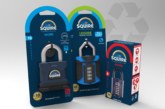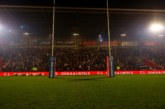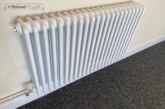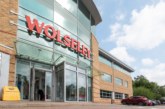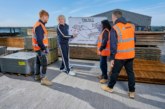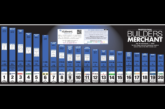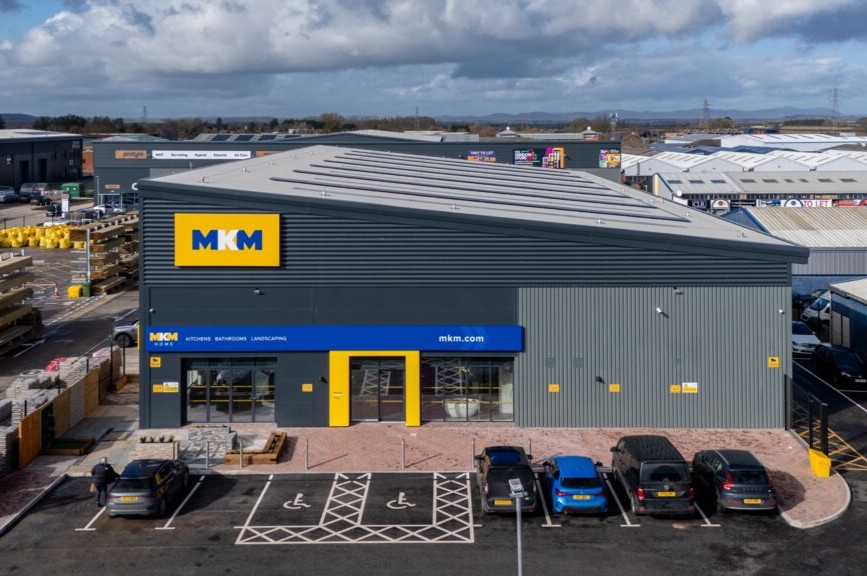
MKM Building Supplies reports that it is “stepping up its sustainability game” — cutting carbon, boosting energy efficiency and backing greener building solutions across the board.
The company’s newly opened Cheltenham branch – its first to have the entire shell structure built to BREEAM Excellent standards – is said to mark a major milestone on its wider sustainability journey. Designed as an “all-electric site,” the facility includes a roof-mounted solar PV array, air-source heating systems, MVHR, movement-controlled LED lighting systems and intelligent energy management systems. Some 42% of the total annual electricity consumption will be provided by the PV system and with a REGO certified grid supply, the building achieves an operational carbon net zero status for its energy use.
In addition, the branch also deploys electric forklift trucks, EV charging points and will shortly include an electric delivery vehicle. Cheltenham is described as setting a new benchmark for future branches and this is billed as “just one part of a much larger effort to make MKM’s entire business more sustainable.”
Indeed, MKM’s environmental strategy goes beyond branch-level improvements, reflecting a long-term commitment to cutting carbon and improving energy efficiency. As a builders’ merchant operating in a traditionally high-emission sector, MKM recognises the challenges it faces and is “taking a practical, proactive approach, backed by tangible initiatives that aim to drive real change throughout its operations.”
Rachel Constable, Head of ESG, said: “We know that construction has a significant carbon footprint, and we’re not pretending we have all the answers. What we do have is a clear and measurable plan to improve. We’re working within our own operations to cut emissions, and we’re helping customers make informed choices about sustainability.
“Cheltenham is a great example of what’s possible, but it’s just the start.”
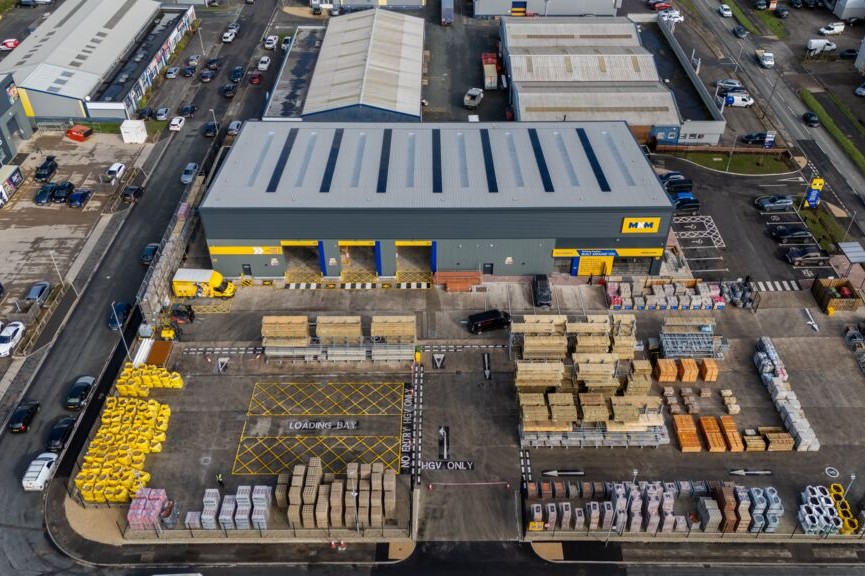
One challenge MKM faces is that most of its branch buildings are leasehold properties. This means the company must work closely with landlords to implement sustainability improvements. However, attitudes are shifting, and the merchant states that landlords “increasingly recognise the long-term benefits of investing in energy-efficient properties—not only to comply with regulations but also to enhance the value of their assets.”
David Shaw, Head of Special Projects, commented: “We don’t own all of our sites, which means we have to collaborate with landlords to make changes. But we’re seeing landlords engage more actively in sustainability initiatives. Greener buildings are more attractive to tenants and investors alike, and this aligns with our drive to operate more efficiently and responsibly.
“From that point, it’s up to us to make as many appropriate decisions as possible – choosing energy-efficient systems and operational best practices – to ensure the entire building is as sustainable as possible.”
MKM’s sustainability progress has also been recognised externally. In April, the business was awarded a Silver EcoVadis Medal, placing it in the top 15% of companies assessed for sustainability globally. The rating reflects strong performance across key areas including environmental impact, labour and human rights, ethics, and sustainable procurement. It’s a clear sign of the company’s commitment to keeping things moving in the right direction — for people, the planet, and the trade.
The drive toward sustainability isn’t just coming from MKM – customers and suppliers are also pushing for greener solutions. Trade professionals are actively seeking Future Homes Standard-compliant materials, while homeowners are investing in energy-saving products. At the same time, the firm’s long-standing suppliers are evolving their own sustainability commitments, ensuring the supply chain supports a lower-carbon future.
“We’re responsible for our Scope 1 and 2 emissions which includes electricity, gas, biomass, and diesel, but we know from our Scope 3 emissions work, that the biggest impact comes through our supply chain,” explains Rachel. “Our suppliers are stepping up—offering more sustainable materials, reducing their own emissions, and embedding sustainability into their operations. We see ourselves as the link between these suppliers and our customers, ensuring that demand for greener construction is met with the right solutions.”
For example, several branches have created dedicated in-store displays featuring low-carbon heating solutions from leading manufacturers such as Grant, Samsung, and Bosch. These initiatives are further strengthened by MKM’s acquisition of Oceanair – an award-winning HVAC distributor specialising in air-to-water heat pump solutions and training. Through Oceanair and its specialist platform Oceanashp.co.uk, the business now offers access to technical support, system design expertise, and accredited training, reinforcing its commitment to helping customers transition to more sustainable, future-ready heating technologies.
A key part of the strategy is also related to its own vehicles. Rachel said: “As a builders’ merchant, we rely on our fleet to deliver for our customers, and it would be naïve not to acknowledge that transport remains our largest source of emissions within scope 1 & 2. But that doesn’t mean we can’t make improvements.
“We’re rolling out technology to help us track fleet emissions at a branch level and making strategic investments to lower our impact. We recently introduced our first electric crane and we’re transitioning our forklift fleet, with close to 50% now fully electric and expansion planned across additional branches. We’ve also adopted Compressed Natural Gas (CNG) HGVs where infrastructure allows, with a growing number now operating in our logistics network.”
She concluded: “Our focus on sustainability isn’t just about compliance—it’s about doing the right thing and leading the way in the industry. We’re committed to embedding sustainability across our business as we progress towards our net zero targets.”

